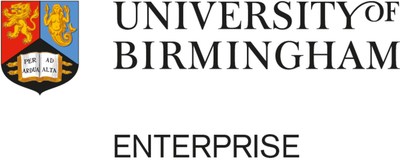|
16.08.2021 23:17:00
|
Birmingham researchers confirm speed, simplicity and sensitivity for new COVID-19 test
BIRMINGHAM, England, Aug. 16, 2021 /PRNewswire/ -- Researchers from the University of Birmingham, U.K., have confirmed the speed, accuracy and simplicity of a novel, highly sensitive testing method for COVID-19 that can be deployed at entertainment venues, airport arrival terminals, and in remote settings where clinical testing laboratories are not available.

The scientists used a three way comparison study to confirm that the Exponential Amplification Reaction (EXPAR) method is just as sensitive, but faster, than both PCR and LAMP tests which are currently used in hospital settings. The Birmingham COVID-19 test, called RTF-EXPAR, gives a sample-to-signal time of under 10 minutes, even for low viral levels where current lateral flow tests are less effective.
Professors Tim Dafforn from the School of Biosciences, and Jim Tucker from the School of Chemistry, worked with graduate student Jake Carter, and Professor Andrew Beggs from the Institute of Cancer and Genomic Sciences on the study, which was published today in PNAS.
Both PCR and LAMP tests detect viral RNA, which can be present in extremely low levels in swabs taken from the mouth and nose. These tests use a two-step process which involves first converting to RNA to DNA (a process called reverse transcription) and then 'amplifying' the material many times over so it can be detected in the sample.
Professor Tim Dafforn said: "Both the reverse transcription and amplification steps slow down existing COVID assays that are based on nucleic acid detection, compared to antigen tests, such as lateral flow, which do not have these steps. However, while this makes lateral flow tests faster than those based on PCR and LAMP, in return they are typically less sensitive. An ideal test would be one that is both sufficiently sensitive and speedy – our test, called RTF-EXPAR, achieves this goal.
RTF-EXPAR achieves this feat in two ways – firstly the assay team designed a new RNA-to-DNA conversion step that avoids reverse transcription, making it reverse transcription-free (RTF). Secondly their amplification step to generate the read-out signal uses EXPAR, an alternative DNA amplification process to PCR and LAMP.
Professor Dafforn added: "EXPAR amplifies DNA at a single temperature, thus avoiding lengthy heating and cooling steps found in PCR. However, while LAMP also uses a single temperature for amplification, EXPAR is a simpler and a more direct process, in which much smaller strands are amplified. This makes EXPAR an even faster DNA amplification technique than not only PCR but also LAMP."
The study revealed that the RTF-EXPAR method converts under 10 strands of RNA into billions of copies of DNA in under 10 minutes, using a one-pot assay that is compatible with more basic, benchtop equipment than that used with current testing methods.
RTF-EXPAR also demonstrated significant improvements over both PCR and LAMP-based assays on time to signal detection. At low concentrations of RNA (7.25 copies/µL), the time to signal detection was 42.67 (± 0.47) minutes for PCR, 11.25 (± 0.20) minutes for LAMP, and 8.75 (± 0.35) minutes for EXPAR. At high (1450 copies/µL) concentrations of viral RNA, the time to signal detection was 34.00 (± 0.00) minutes for PCR, 11.25 (± 0.20) minutes for LAMP, and 3.08 (± 0.42) minutes for EXPAR.
Identification of the optimal sequence was clearly an important step in the development of the EXPAR method, and the sequence detected in the study, which comes from the Orf1ab gene in the SARS-CoV-2 genome, has been shown to be conserved in all current variants of COVID1. However, the RTF-EXPAR method can be quickly adapted should new variants emerge, or for testing other viral pathogens such as Influenza, Respiratory Syncytial Virus (RSV), or Ebola, where near-patient testing is required to prevent more widespread transmission.
The assay has been tested at the Surgical Research Laboratory at the University of Birmingham. Professor Andrew Beggs, whose team conducted the testing, commented: "The testing used swabs containing a typical range of viral loads seen during the pandemic, and had a six-minute cut-off time. The analysis showed RTF-EXPAR's sensitivity is equivalent to quantitative PCR testing, with a positive predictive value of 89%, and a negative predictive value of 93%. We expect to publish the full results of this testing in the near future."
The team is now seeking commercial partners for rapid licensing, to make the RTF-EXPAR test as available as widely as possible.
Ultra-rapid Detection of SARS-CoV-2 RNA using a Reverse Transcription-Free Exponential Amplification Reaction, RTF-EXPAR, is published in the Proceedings of the National Academy of Sciences and is available at
https://www.pnas.org/content/118/35/e2100347118.
For commercial enquiries please contact Dr Veemal Bhowruth, University of Birmingham Enterprise, email: v.bhowruth@bham.ac.uk.
About the University of Birmingham
The University of Birmingham is ranked amongst the world's top 100 institutions, and its work brings people from across the world to Birmingham, including researchers and teachers and more than 6,500 international students from nearly 150 countries.
University of Birmingham Enterprise helps researchers turn their ideas into new services, products and enterprises that meet real-world needs, and manages the University's Academic Consultancy Service.
We are on LinkedIn and Twitter, and our technologies are listed on www.IN-PART.com.
Reference:
Logo - https://mma.prnewswire.com/media/1394380/University_of_Birmingham_Enterprise_Logo.jpg
![]() View original content:https://www.prnewswire.com/news-releases/birmingham-researchers-confirm-speed-simplicity-and-sensitivity-for-new-covid-19-test-301356244.html
View original content:https://www.prnewswire.com/news-releases/birmingham-researchers-confirm-speed-simplicity-and-sensitivity-for-new-covid-19-test-301356244.html
SOURCE University of Birmingham Enterprise
 Der finanzen.at Ratgeber für Aktien!
Der finanzen.at Ratgeber für Aktien!
Wenn Sie mehr über das Thema Aktien erfahren wollen, finden Sie in unserem Ratgeber viele interessante Artikel dazu!
Jetzt informieren!